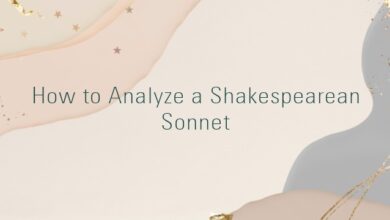
O! for my sake do you with Fortune chide,
The guilty goddess of my harmful deeds,
That did not better for my life provide
Than public means which public manners breeds.
Thence comes it that my name receives a brand,
And almost thence my nature is subdued
To what it works in, like the dyer’s hand:
Pity me, then, and wish I were renewed;
Whilst, like a willing patient, I will drink
Potions of eisel ‘gainst my strong infection;
No bitterness that I will bitter think,
Nor double penance, to correct correction.
Pity me then, dear friend, and I assure ye,
Even that your pity is enough to cure me.
This sonnet continues the poet’s defence of his conduct, which on the surface looks bad. It has brought him shame and disgrace and a swerving away from his beloved. However he decides to put most, if not all the blame upon fortune, which has not provided him with noble birth or wealth, with the result that he must ply his wares in the market place.
Commentators since the late eighteenth century, starting with Edmund Malone, have noticed that this sonnet seems to refer directly to Shakespeare’s career in the theatre. Whether this is indeed the case cannot be proven, but it is impossible not to be curious about the life of one so famous, and to speculate on the possible direction of these references. The poem by John Davies of Hereford, printed at the end of this page, seems to confirm that being associated with the playhouse brings a stain to the character in the common view. The Puritans certainly believed so, and maintained continuous opposition to the theatres. They believed them to be the breeding gound of all manner of sin and viciousness, and in the additional notes below there is a typical text railing against the evil influence of plays and interludes.
However it is not possible to be certain on this matter. The language of ‘strong infection’ and ‘double penances’ required to assuage ‘harmful deeds’ seems to be too extreme to refer only to a career upon the stage. One feels tempted to ask ‘What other strange errors of commission or omission lie behind these confessions?’ Perhaps the sin is no other than a visit to a brothel, followed by a severe dose of the pox, a strong infection in other words, which brings a stain upon the character both moral and physical. That would indeed require some strong potions of eisel to effect a cure, given the uncertain state of medicine at the time. Or perhaps it is no more than a social gaffe, an assumption of familiarity with a social superior which was not justified, and brought ridicule upon the foolish poet who presumed too much. It is possible also that there is an element of allegory, and that the strong infection is a temporary adherence to the ‘wrong’ religion. Potions of eisel and double penance would be very appropriate in such circumstances and the poet is looking forward here to his redemption and return to the fold.
Alas we cannot know what lies behind all this, whether allegorical or factual, or both, but it is nevertheless fascinating that we have a potential insight into the life of our famous poet, an autobiographical vignette which tells us something about how he lived and thought. For there is nothing in the plays which is so direct and revealing, and we see here face to face for one brief moment what elsewhere is hidden behind a curtain of distance, detachment and intrigue.
The 1609 Quarto Version
OFor my ſake doe you wifh fortune chide
The guiltie goddeſſe of my harmfull deeds,
That did not better for my life prouide,
Then publick meanes which publick manners breeds.
Thence comes it that my name receiues a brand,
And almoſt thence my nature is ſubdu’d
To what it workes in,like the Dyers hand,
Pitty me then,and wiſh I were renu’de,
Whilſt like a willing pacient I will drinke,
Potions of Eyſell gainſt my ſtrong infection,
No bitterneſſe that I will bitter thinke,
Nor double pennance to correct correction.
Pittie me then deare friend,and I aſſure yee,
Euen that your pittie is enough to cure mee.
Commentary
1. O! for my sake do you with Fortune chide,
with – this is the generally accepted emendation of Q’s wish. Some editors have recently challenged the change, and justified retaining wish. The difficulty that prompted the emendation originally is that of providing a coherent meaning for what follows, if wish is retained. The guilty goddess then becomes a sort of adjunct of Fortune, or a totally independent deity who allots circumstances to the individual. Alternatively, if she is taken to be in apposition to Fortune and descriptive of her, then chide has no object but hangs vacuously in the air. There is no one and nothing to chide, unless one understands ‘me. the poet’ as the object, without it being stated.
The emendation to with provides a more intelligible reading, because chide with is an idiom used elsewhere in Shakespeare:
……………………………..’tis but his humour:
The business of the state does him offence,
And he does chide with you. Oth.IV.2.167-8.
although it must be admitted it is not a common idiom. But the line makes more sense taking with as the reading, and it ties in more easily with what follows. The poet enjoins his beloved to rail against fortune as the goddess who, by alloting to him a lowly status among mankind, forces him to commit acts of shame (the harmful deeds of line 2 and the shames of 112.6), acts of which it is doubtful if we can ever know much. To blame fortune for actions of betrayal and bad faith, actions which were presumably voluntary, seems to be a piece of casuistry which does not show the speaker in the best of lights. Yet here that is what he seems to be partially doing by shifting the blame from himself to the circumstances of his birth and the subsequent public (prostituted?) life that he was forced to lead. We have to make allowances for the fact that this sonnet is placed amidst those in which the poet finds himself forced to discover excuses for his somewhat tacky behaviour, and to prove that his love has been renewed, and is as fresh as ever. That he comes up with some curious arguments is not a matter to be scrutinized too deeply, for who would not do the same in similar circumstances? Anything must be advanced as justification, all material may be employed, as long as he does not at any time admit that his unfaithfulness was unfaithfulness. Oh no! His love is an ever fixed mark, and it is to that to which he must return, whatever the momentary aberrations which Fortune or his own blindness or wilfulness occasionally thrust upon him. That is the message which this sonnet is aiming for, a message which leads up, through this short group (109-118) to the crowning glory of the declaration in Sonnet 116, a declaration which is both impatient and triumphant:
Let me not to the marriage of true minds
Admit impediments…2. The guilty goddess of my harmful deeds,guilty goddess – if with is accepted as a viable emendation then the ‘guilty goddess’ becomes synonymous with Fortuna. She is the goddess who has thrown upon the poet an evil fate as a result of which he has committed evil deeds.
my harmful deeds – in the context of the preceding sonnets these harmful deeds are ‘going here and there’, ‘being absent’, ‘ranging’, ‘selling cheap what is most dear’, ‘grinding one’s appetite’, and in the context of what follows a similar list arises, ‘scanted all’, ‘been frequent with unknown minds’,’ hoisted sail to all the winds’, ‘been unkind’. The suspicion is that all the harmful deeds are versions of philandering by which the youth has been betrayed, slighted and neglected.3. That did not better for my life provideThat = who, sc. Fortune. Fortune did not give me a good start in life, did not provide me with a comfortable income, and did not give me a noble lineage.4. Than public means which public manners breeds.
public means – a phrase of uncertain meaning. Usually it is taken as referring to a life in the theatre, ever since that interpretation was first suggested by Malone. Players put their lives, as it were, upon the public stage and derived their ‘means’ of livelihood from it. Being associated with the theatre was considered by many to be immoral, and the increasing power of Puritan sects posed a continuous threat to the theatre and to all forms of entertainmnet. (See introductory note above and Additional Notes below). However the use of the word public on two other occasions in the sonnets is not indicative of a demeaning context, but, if anything, the opposite:
Let those who are in favour with their stars
Of public honour and proud titles boast, 25
I may not evermore acknowledge thee,
Lest my bewailed guilt should do thee shame,
Nor thou with public kindness honour me, 36
There are 37 uses of the word in the plays, mostly in phrases such as public weal, public street, public show. The only occasion in which it definitely has a pejorative implication is when Othello castigates Desdemona, accusing her of being a whore.
What committed?
Committed! O thou public commoner! Oth.IV.2.73-4.
In this sonnet however the subsequent line is decisive in showing that the ‘public means’ contribute to shame and disgrace of some sort, probably by a lowering of social status. Whether or not the brand or stigma (see next line) was the result of his involvement in the theatre or simply something which he perceived as the result of lowly birth, or for some other reason, it is impossible to say. Certainly, being descended from a corn dealer (or glover, or retail butcher) would not have counted for much in the circles in which an aristocrat moved, if indeed the beloved youth was an aristocrat. And Shakespeare seems to have been very conscious of this fact and to have made efforts to move up in the world, acquiring a coat of arms and buying the most expensive property in Stratford. The ‘public means’ may simply imply that he had to make a living somehow, regrettable though it was, for, by accident of birth, he had neither property nor a title, and his necessary involvement in the mercantile and menial world was a source of rankling resentment.
It is thought that there are references to Shakespeare’s position in the theatre, and a defence of his social status, possibly referring to this sonnet, in a poem by John Davies of Hereford, published in 1603 in Microcosmos. (See below).5. Thence comes it that my name receives a brand,Thence = as a result of the ‘public means’ and ‘public manners’. Or, as a result of my ‘harmful deeds’. brand = literally, the mark caused by a branding iron. Figuratively, a stain or disgrace, a blot on one’s reputation and fair name. Criminals were often branded with a red hot iron in a prominent place, usually on the forehead, with the intention of showing to the world that they were malefactors. The scars were almost impossible to remove. This has been a common practice throughout history, and has only been superceded in the 20th century by more humane methods of punishment.6. And almost thence my nature is subduedAnd almost thence my nature = as a result of which my nature is almost. The almost gives a hint of reservation, as if the poet doubts his own explanation of events, or as if he wishes to reserve some part of himself from the imminent corruption.
subdued = overcome by, crushed, vitiated; subjugated to. Compare:
My father’s loss, the weakness which I feel,
The wreck of all my friends, nor this man’s threats,
To whom I am subdued, Tem.I.2.487-9.7. To what it works in, like the dyer’s hand:like the dyer’s hand = as the dyer’s hand, which becomes stained by the dyeing solutions into which the fabrics are dipped.8. Pity me, then, and wish I were renewed;wish – defenders of wish in line 1 have noted the repetition of the word in this line. wish I were renewed = wish that I could be renewed (and be faithful once more).9. Whilst, like a willing patient, I will drinka willing patient = a submissive patient, one who is desirous of a cure.10. Potions of eisel ‘gainst my strong infection;
infection = staining, corruption, disease. The word infect, from the Latin inficere, originally meant ‘to dye’, and this sense is obviously relevant here, owing to the imagery of the dyer’s hand in line 7. It was also used as a term for the bubonic plague, or black death, as may be seen from the example below, where the words infectious and infection are both used.
…………….the searchers of the town,
Suspecting that we both were in a house
Where the infectious pestilence did reign,
Sealed up the doors, and would not let us forth;
So that my speed to Mantua there was stayed.
FRIAR L. Who bare my letter, then, to Romeo?
FRIAR J. I could not send it,–here it is again,–
Nor get a messenger to bring it thee,
So fearful were they of infection. RJ.V.2.8-16.
Figuratively the poet is implying that he was infected with the plague of infidelity. Infection is also used in connection with the youth’s earlier backslidings:
Ah! wherefore with infection should he live, 67
But if that flower with base infection meet, 94
where it seems to be a catch-all word to cover various sexual peccadilloes by the youth.
Note also that the words potion and infection were often used in connection with being in love. Love potions, drinks that could be given to one you loved in order to make him/her love you in return, were widely believed in. Shakespeare uses infected to describe Miranda’s infatuated love for Ferdinand in The Tempest.
Poor worm, thou art infected!
This visitation shows it. Tem.III.1.32-3.11. No bitterness that I will bitter think,‘Whatever bitter remedies are prescribed, I will not think they are bitter, but like a patient patient will take them meekly’. The remedies presumably were not to be physical potions, but moral restraints and chastisements.12. Nor double penance, to correct correction.The connection with the previous line implies that double penances and double corrections (chastisements) will not be thought too much, or too bitter.
to correct correction = to put right a former attempt at correction, which failed, by using a further correction.
correction – is here used in the sense of a moral coercion, often backed up by the use of physical force or punishment. (See OED.4 which gives the following example from 1624 Capt. Smith Virginia ii. 38 Their ordinary correction is to beate them with cudgels.) The term ‘House of Correction’, a penitentiary, was in frequent use until the early 20th. century, but is now obsolete.
Note however that the main point of the line is almost independent of the exact meaning and is conveyed by the splendid iteration of ‘correct correction’ which emphasises and reiterates the ‘double penance’ mentioned in the first half of the line.13. Pity me then, dear friend, and I assure ye,Pity me then = therefore pity me (rather than castigating me).14. Even that your pity is enough to cure me.
Even that your pity = (I assure you) that even that pity of yours, on its own, without the help of any further chiding, is enough etc.
to cure me – i.e. from the strong infection of line 10, or the public means and public manners of line 4.
Additional notes
From Microcosmos, by John Davies of Hereford. Published 1603.
Players, I love ye, and your Quality
As ye are men that pass-time not abused,
And some I love for painting, poesie,
And say fell Fortune cannot be excused,
That hath for better uses you refused
…..
And though the stage doth stain pure gentle blood
Yet generous ye are in mind and mood.
And some I love – a marginal note refers to W.S., R.B., probably William Shakespeare and Richard Burbage.
See GBE, Note to line 4, p.222.
The Puritan condemnation of Theatres
Do they not maintain bawdry, insinuate foolery, and renew the remembrance of heathen idolatry? Do they not induce whoredom and uncleanness? Nay are they not rather plain devourers of maidenly virginity and chastity? For proof whereof but mark the flocking and running to Theaters and Curtains, daily and hourly, night and day, time and tide, to see plays and interludes, where such wanton gestures, such bawdy speeches, such laughing and fleering, such kissing and bussing, such clipping and culling, such winking and glancing of wanton eyes, and the like is used, as is wonderful to behold. Then these goodly pageants being ended, every mate sorts to his mate, every one brings another homeward of their way very friendly, and in their secret conclaves (covertly) they play the sodomites, or worse. And these be the fruits of plays and interludes, for the most part. And whereas, you say, there are good examples to be learnt in them: truly so there are; if you will learn falsehood; if you will learn cozenage; if you will learn to deceive; if you will learn to play the hypocrite, to cog, to lie and falsify; if you will learn to jest, laugh and fleer, to grin, to nod and mow; if you will learn to play the Vice, to swear, tear and blaspheme both heaven and earth; if you will learn to become a bawd, unclean, and to devirginate maids, to deflower honest wives; if you will learn to murder, flay, kill, pick, steal, rob and rove; if you will learn to rebel against princes, to commit treasons, to consume treasures, to practice idleness, to sing and talk of bawdy love and venery; if you will learn to deride, scoff, mock and flout, to flatter and smooth; if you will learn to play the whoremaster, the glutton, drunkard, or incestuous person; if you will learn to become proud, haughty and arrogant; and finally if you will learn to contemn God and all His laws, to care neither for Heaven not Hell, and to commit all kinds of sin and mischief, you need to go to no other school, for all these good examples may you see painted before your eyes in interludes and plays.
PHILIP STUBBES, The Anatomie of Abuses 1583






